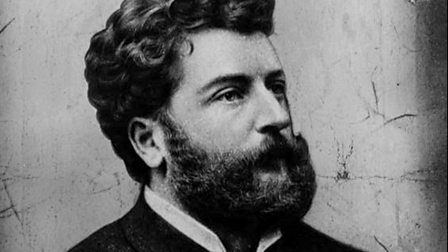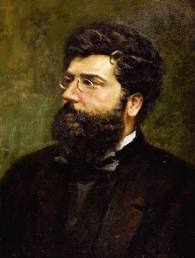Georges Bizet, born Alexandre César Léopold Bizet on October 25, 1838, in Paris, France, was a prominent French composer of the Romantic era. His music, particularly his operatic works, became known for their melodic beauty, innovative orchestration, and dramatic intensity. Although his career was relatively short, his contributions to classical music have left a lasting legacy.
- Early Prodigy: Georges Bizet was a musical prodigy. Born on October 25, 1838, in Paris, France, he was admitted to the prestigious Paris Conservatoire at the age of nine. His exceptional talent was evident from a young age, and he won numerous awards during his time there, including the esteemed Prix de Rome in 1857.
- Influential Teachers: At the Conservatoire, Bizet studied under some of the most influential composers and musicians of the time, including Charles Gounod and Fromental Halévy. These mentors played a significant role in shaping his musical style and career.
- Carmen’s Initial Failure: Bizet’s most famous work, the opera “Carmen,” is now considered one of the greatest operas ever written. However, it was initially met with harsh criticism and poor reception at its premiere in 1875. Critics and audiences found its themes of betrayal, lust, and murder too scandalous and controversial for the time.
- Innovative Composer: Bizet was known for his innovative compositions that often pushed the boundaries of traditional opera. His use of realistic characters and incorporation of Spanish musical elements in “Carmen” were groundbreaking and have influenced countless composers and musicians since.
- Tragic Death: Georges Bizet died tragically young at the age of 36. He passed away from a heart attack on June 3, 1875, just three months after the premiere of “Carmen.” His untimely death meant he never witnessed the eventual success and acclaim that “Carmen” would achieve.
- Other Notable Works: While “Carmen” is his most famous work, Bizet composed several other significant pieces. These include the opera “Les pêcheurs de perles” (The Pearl Fishers), known for its beautiful duet “Au fond du temple saint,” and the incidental music for Alphonse Daudet’s play “L’Arlésienne,” which includes the famous “Farandole.”
- Struggles with Recognition: Throughout his life, Bizet struggled for recognition and financial stability. Despite his talent, many of his works were either ignored or criticized during his lifetime, leading to a sense of professional and personal frustration.
- Piano Virtuoso: In addition to his composition skills, Bizet was an accomplished pianist. His piano skills were highly regarded, and he often performed his own works. Some of his compositions for piano, such as the “Chromatic Variations,” are still appreciated for their technical brilliance.
- Personal Challenges: Bizet faced numerous personal challenges, including health issues and a tumultuous marriage to Geneviève Halévy, the daughter of his former teacher Fromental Halévy. Despite these difficulties, he continued to produce remarkable music.
- Posthumous Recognition: After his death, Bizet’s music gained the recognition it deserved. “Carmen” went on to become one of the most performed operas worldwide. His innovative style and emotional depth have cemented his legacy as one of the great composers of the 19th century.
Georges Bizet’s life and career were marked by both triumphs and struggles, but his contributions to the world of classical music remain enduring and influential. His work continues to captivate audiences and inspire musicians around the globe.


Comments are closed